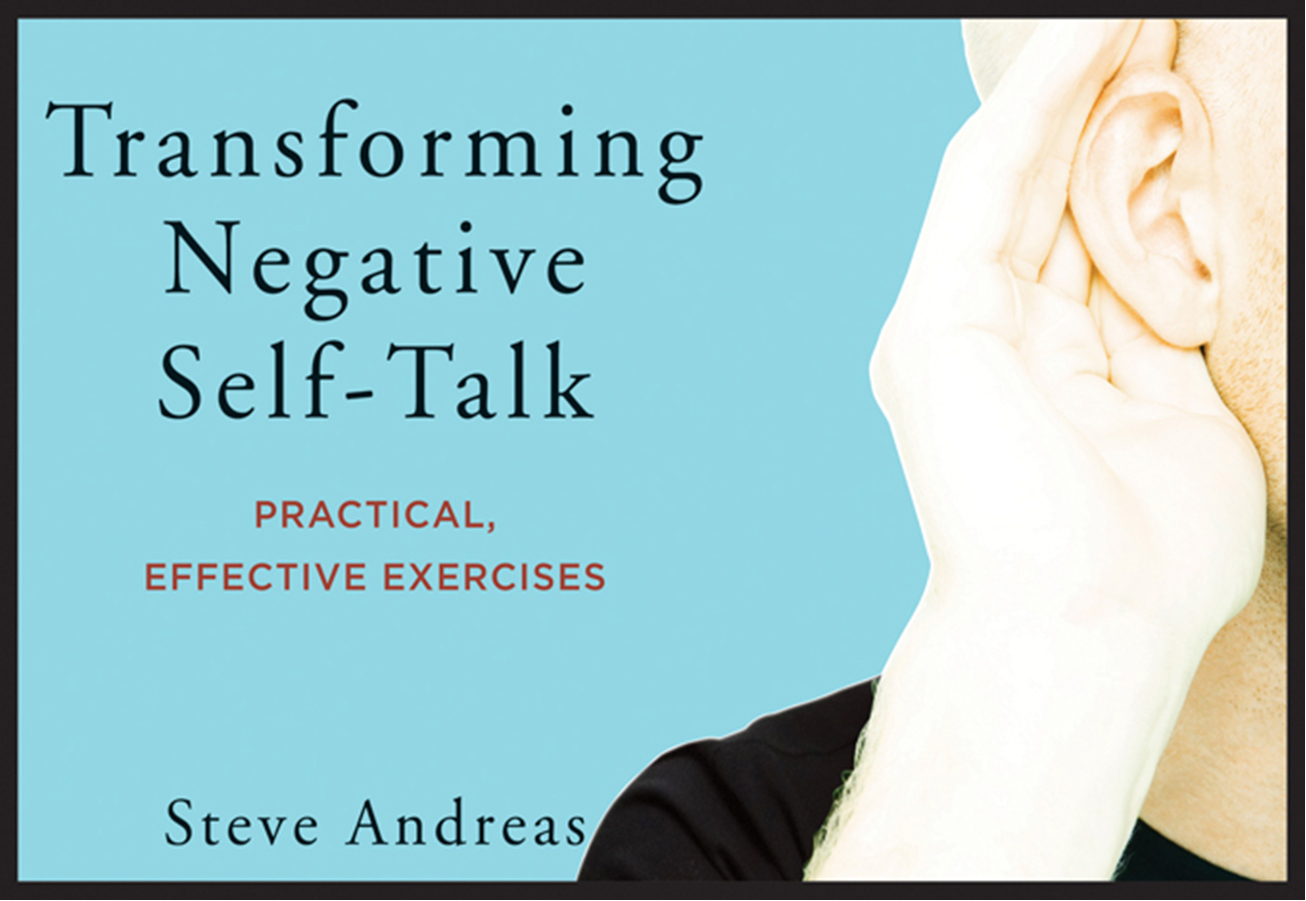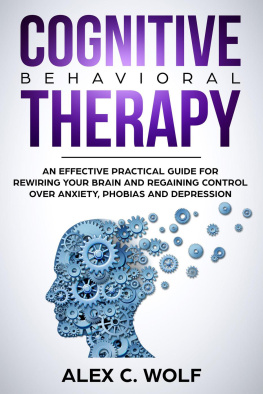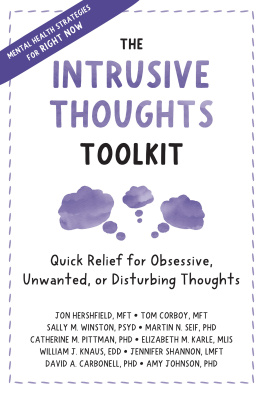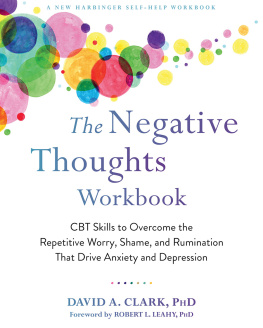
Transforming
Negative Self-Talk

Practical, Effective Exercises
Steve Andreas

W. W. Norton & Company
New York London
Contents 
Your task is that of altering, not abolishing.
Milton H. Erickson (in Rossi & Ryan, 1986)
Acknowledgments 
I recall an old Sufi story of a good man who was granted one wish by God. The man said he would like to go about doing good without knowing about it. God granted his wish. And then God decided that it was such a good idea, he would grant that wish to all human beings. And so it has been to this day.
Robert Fulghum, All I Really Need to Know I Learned in
Kindergarten (1986)
Through over a half-century of working to understand human nature, and searching for ways that people can improve their lives, I have been influenced by hundreds of thousands. When I think of all the psychologists and therapists who were famous and influential when I was in graduate school in the 1950s, the work of most of them now rests securely in the dustbin of history. However, the work of two stand out as having withstood the acid test of time and results. In my view, Milton Erickson and Virgina Satir were the two greatest therapists who ever lived. However amazing their work was, they were not as adept at transmitting their skills and understandings to their students. Fortunately, they both left behind rich legacies in the form of videos and writings, gold mines for future generations to explore and develop further.
Richard Bandler and John Grinder, the developers of Neuro-Linguistic Programming (NLP) taught me the tools to understand many of the systematic subtleties in how Erickson and Satir worked their magic with suffering people, and I continue to use these understandings to learn and develop yet more and better methods, and make these available to others.
My many thoughtful colleaguesespecially my wife Conniraeand participants in training seminars have also contributed immensely by offering me their experience, thoughts, suggestions, and criticism, helping me test and develop better methods and understandings, separating the wheat from the chaff (and in the field of psychotherapy there is an incredible amount of chaff).
Then there are all the others who offered an example, a story, an objection, a question, an observation, or a chance word. Who could notice or remember all the seeds that were planted, and what grew and blossomed from what seemed at the time to be an inconsequential remark? I thank you all for being a part of my life; I hope I have also been, in some small measure, a useful part of yours.
Steve Andreas
Introduction 
Nearly everyone has negative internal self-talk at times; some of us have this internal chatter going on almost all the time. An internal voice may remind us of past failures, sorrows, or disappointments, torture us with criticism or verbal abuse, describe frightening or unpleasant futures, or disturb us in other ways. You failed miserably. What a loser I am. Ill never succeed. Life is a crock. My life is over. Typically this kind of internal voice causes unpleasant feelings, which are not very helpful in reaching goals and succeeding in life.
A thought like Nothing I can do will make a difference in a low, slow voice can easily result in depression. Im think Im about to die in a rapid, high-pitched tempo can result in anxiety or panic. Those bastards are out to get me, in a low angry tone can result in violence or paranoia. Often someones unpleasant feelings are so strong that he or she doesnt realize that they are a response to what an internal voice is saying.
You can probably easily think of sometime in your life when an internal voice did something like this, putting you into an unpleasant state. These bad feelings can be the root cause of a very wide variety of problems, some of them quite serious and long term. In this book I am going to show how these inner voices can be transformed, and how that can make a positive impact in many areas of our lives.
Negative self-talk is something that is not usually under our conscious control; it just happens by itself, and most people find it impossible to stop it or not do it. In fact, trying to stop it generally makes it even more intrusive and troublesome. Our conscious minds are very good at solving many of our problems, but when that fails, we need to learn more about how we function automatically and unconsciously in order to find solutions.
When I use the word unconscious , I dont mean Freuds idea of a seething cauldron of forbidden desires; much of our unconscious functioning works very nicely and efficiently, such as when we think to ourselves, What is his name? and the name pops into our awareness. I just mean all the aspects of our lives that we dont notice and that we are literally not conscious of. Many of these aspects can become conscious if we pay close attention and ask the right kind of question. That makes it possible to make changes in the process, and then allow the process to be unconscious again.
All of Us Hear Voices
The realization that everyone hears internal voices is relatively recent. Not so long ago, most psychiatrists thought that hearing voices was a sign of psychosis, and a few still do. A patient would report hearing voices, and the psychiatrist would say to himself internally, Hmm, this guy is hearing voices; he must be nuts, without realizing that he was also hearing a voice, and withoutin most casesbeing nuts himself.
The inner voices of some psychotic patients may sound much louder than what the rest of us hear, and sometimes they may seem to be coming from their surroundings, but it is the same process. In earlier times, hearing an internal voice was thought to be a message from God, the devil, or some other external entity. Even today, some people who commit crimes say that they were ordered to do it by a voice that they heard. The devil made me do it.
The Benefits of Internal Self-Talk
Hearing internal voices is a natural part of being able to understand and produce language. With the exception of a few people with damage to the language area of the brain, or people who were born completely deaf, we all have internal voices, and usually they provide very useful information and direction. These voices may orient us to tasks that we need to accomplish, alert us to some kind of danger, review the events of the day, and so on. Theres an important meeting tomorrow morning. Lets get out of here before trouble starts. I got quite a lot done this week.
Sometimes inner voices offer us useful advice. Look both ways before crossing a street, is a voice that most parents deliberately try to instill in their small children to protect them from being run over. At other times, an internal voice may simply offer information that is needed to solve a problem, or direct our attention back to an unfinished task. I wonder if those towels are in the laundry. Id better get going on that homework if Im going to get enough sleep tonight.
Next page
















